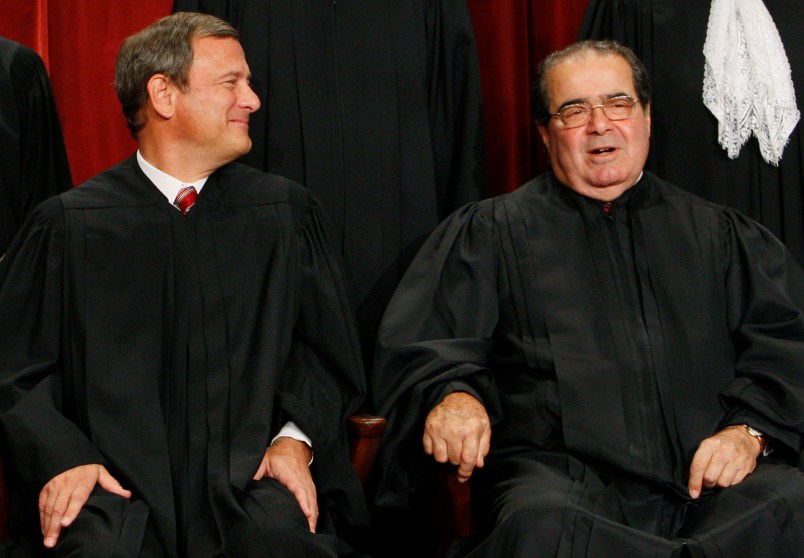On Monday, the Supreme Court is poised to rule in a landmark case about whether for-profit corporations are entitled to religious-based exceptions from neutral laws.
The challenge was brought by the Southern Baptist owners of Hobby Lobby, an arts and crafts chain, and the Mennonite owners of Conestoga Wood, a cabinet maker. Both sued for relief from a mandate under Obamacare that profit-making businesses include emergency contraceptives for female employees in their insurance plans at no extra cost. They said the requirement to cover contraceptives like Plan B and Ella violates their religious liberty.
The lawsuits are not about the First Amendment. They’re about whether the birth control mandate passes muster under the 1993 Religious Freedom Restoration Act, which says laws that substantially burden a person’s exercise of religion be narrowly tailored to meet a compelling governmental interest.
Oral arguments in March revealed a divided court. Liberal-leaning justices, particularly the three women, warned that granting such an exemption could declare open season on neutral law for any corporation that can come up with a religious objection. Conservative-leaning justices appeared ready to rule against the Obama administration, expressing deep skepticism that the mandate passes the strict scrutiny test imposed by Congress.
The expected swing vote is Justice Anthony Kennedy, who appeared far from convinced that the contraceptive mandate is legal. “Under your view, a profit corporation … could be forced in principle to pay for abortions,” he told the administration’s lawyer, Donald Verrilli. But he also expressed a modicum of sympathy for the female employees who might be harmed, wondering aloud if the religious beliefs of their employers “trump” their right to contraceptive services without co-pays, as granted by Congress.
The Obama administration argues that the mandate does not violate anybody’s religious liberty, and that it merely ensures that female employees are treated equally regardless of the religious views of their bosses. If it wins, the birth control rule will remain in effect and other for-profit corporations will have to abide by it. (Exceptions have been made for religious nonprofits and houses of worship.)
If Hobby Lobby and Conestoga Wood win, they’d be the first for-profit corporations to win a court-authorized exemption from a neutral law, a move that progressives say would be not only dangerous but outside the spirit of RFRA, which was passed by a Democratic Congress and enacted by Bill Clinton. The battle is a flashpoint in the broader war over Obamacare, pitting Democrats versus Republicans, liberals versus conservatives.
The implications of a victory for the religious business owners may be vast. Justice Elena Kagan, for instance, asked if it would tie the hands of future courts if a corporation comes before them and claims religious objections to abiding by the minimum wage or sex discrimination laws.
Chief Justice John Roberts suggested a way out of that dilemma: only allow “closely held” businesses to sue for such exemptions, and not publicly-traded corporations like WalMart or ExxonMobil. But he didn’t sound too concerned about that possibility, suggesting the Supreme Court may just leave that question to another day.
“[Y]ou avoid all of the problems with what to do if there’s a percent ownership of the shareholders, if you simply say that it’s in this type of Chapter S Corporation that is closely held,” Roberts said during oral arguments. “Whether it applies in the other situations is a question that we’ll have to await another case when a large publicly-traded corporation comes in and says, we have religious principles — the sort of situation I don’t think is going to happen.”







It all boils down to whether corporations, a legal entity designed to protect shareholders from liability, are equivalent to people who have constitutional rights. A Supreme Court ruling in favor of corporations would, not could, open up a can of worms that may take years or even decades to clean up. The question is now whether their hatred for the President will trump common sense and legal precedence.
Given the Court was unanimous that a paltry buffer zone to separate unruly screaming Christo-fascists from the entrance to a women’s health facility (as if that safety zone impeded their freedom of speech to accost, harass, and humiliate women seeking mammograms, contraception, pap smears, and yes, abortions) I would expect a resounding 9-0 from those towering protectors of FREEDUMB in favor of the Christo-fascists who seek to deprive female employees of needed health care, particularly because those Christo-fascists have a lot of money.
The Hobby Lobby owners could care less about contraception. They sell Chinese items, imported from a nation that limits the number of children in families and forces abortions, and where female babies are abandoned to die if they aren’t fortunate enough to be adopted.
These people have no moral standing – they’re just right wing fascists exerting control over employees over matters that are none of their goddamned business, and flaunting their wealth to resist any Federal mandate, like all these sovereign citizens asswipes.
The RFRA should be abolished.
Amen!
The good news is that SCOTUS has a history of keeping their more “controversial” (i.e. non-RW-friendly) rulings for the last day of the term – ACA, Prop 8/DOMA, Lawrence v. Texas. The bad news is that, depute Kennedy’s “wondering” about employees rights to contraception, his questioning was firmly in the Krazee Korner with Scalia and Alito. Also, if it comes down to it, I can easily see Roberts declaring “barriers to birth control no longer exist”, putting those rights on the same funeral pyre he threw discrimination on when SCOTUS gutted the Voting Rights Act.